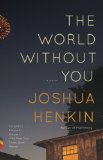Summary | Excerpt | Reading Guide | Reviews | Beyond the book | Read-Alikes | Genres & Themes | Author Bio

I seem to write novels that are domestic and undomestic, rooted and uprooted at the same time. In Wish You Were Here all this is focused in the
paradoxical word "repatriation".
- Graham Swift, in an
interview with The
Guardian
Often, repatriation is used to describe the ceremonial process of a soldier, killed while in service in a foreign country, being returned home for burial. More broadly, repatriation can also represent the journey a person takes to return to their roots - their place of origin or citizenship. Graham Swift skillfully weaves both definitions of the term into Wish You Were Here, as he portrays a soldier's final journey home, and his brother's more symbolic travels to meet him there. In this ninth novel, Swift returns to the same motifs - broken family relationships, English landscapes, and an internal narrative based on memory - that run through nearly all of his books.
Jack Luxton's brother, Tom, was killed in service in Iraq, and Jack must leave his adopted home on the Isle of Wight and return to the place of his own origins. He will meet the plane bringing his brother home and attend the hastily arranged funeral he has coordinated, back in his home village. Jack's road trip to meet his brother's body provides time for reflection, and the tragedies sustained within the Luxton family slowly unfold during his travels.
The story opens rather bleakly: "There is no end to the madness, Jack
thinks, once it takes hold." Jack is looking out his bedroom window. On
the bed beside him, a loaded shotgun rests. A box of cartridges is
ready, just in case. While he waits for his wife, Ellie, to return,
Jack reflects on the choices he has made, and the defining moments of
his life and family, from very recent memories to times much further
past.
Swift uses the third-person narrative, but switches perspectives -
from Jack, to Ellie, to Tom to several other characters. Jack
is a stoic man of few words, not a strong communicator. Early on, a
teenaged Jack has trouble writing a simple postcard to Ellie, while on
holiday with his mum and brother. His mother lends her
support to the task and Jack scribbles "Wish you were here," unaware
that this is the most common thing he could have said, even if it is
the truth. Swift's narrative tone creates some detachment, which is
wholly appropriate to Jack's character, but could be a hindrance for
some readers.
Some of Swift's very deliberate narrative devices could also
prove a frustration for some readers who prefer a faster-paced, more
direct telling, rather than a slow unfolding. The precipitating
incident, the reason for why Jack is sitting on his bed with a loaded
shotgun - which is where we immediately find ourselves in the opening
pages of the novel - is withheld from readers for a very long
time. The mystery - what is Jack going to do? - grips the
reader through the very last page. For patient readers who are willing
to trust Swift's methods and style of storytelling, this novel is an
extremely rewarding experience.
By employing Jack's memory to tell the tale, we are quite literally
inside his mind. At moments this can create a very visceral experience.
Using fairly simple language, yet capturing the innermost feelings of
his characters, Swift allows us to feel the depths of Jack's grief.
There was one event in the story that actually brought tears to my eyes
as I felt the pain and confusion of the moment being shared. There are
only two other novels that have elicited this response from me:
Steinbeck's Of Mice
and Men, and last year's amazing debut novel by Amy
Waldman, The Submission.
In reading Wish You
Were Here I often thought of the opening
line to
![]() This review was originally published in The BookBrowse Review in May 2012, and has been updated for the
January 2013 edition.
Click here to go to this issue.
This review was originally published in The BookBrowse Review in May 2012, and has been updated for the
January 2013 edition.
Click here to go to this issue.

If you liked Wish You Were Here, try these:

by Joshua Henkin
Published 2013
From the author of the New York Times Notable Book Matrimony, a moving new novel about love, loss, and the aftermath of a family tragedy.

by Kristin Hannah
Published 2013
Bestselling author Kristin Hannah explores the intimate landscape of a troubled marriage with this provocative and timely portrait of a husband and wife, in love and at war.
Your guide toexceptional books
BookBrowse seeks out and recommends the best in contemporary fiction and nonfiction—books that not only engage and entertain but also deepen our understanding of ourselves and the world around us.